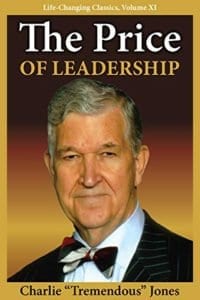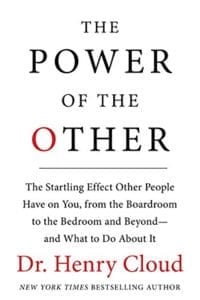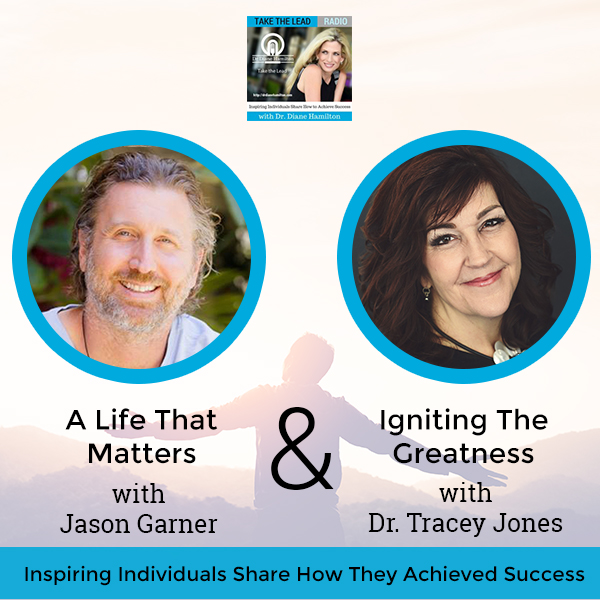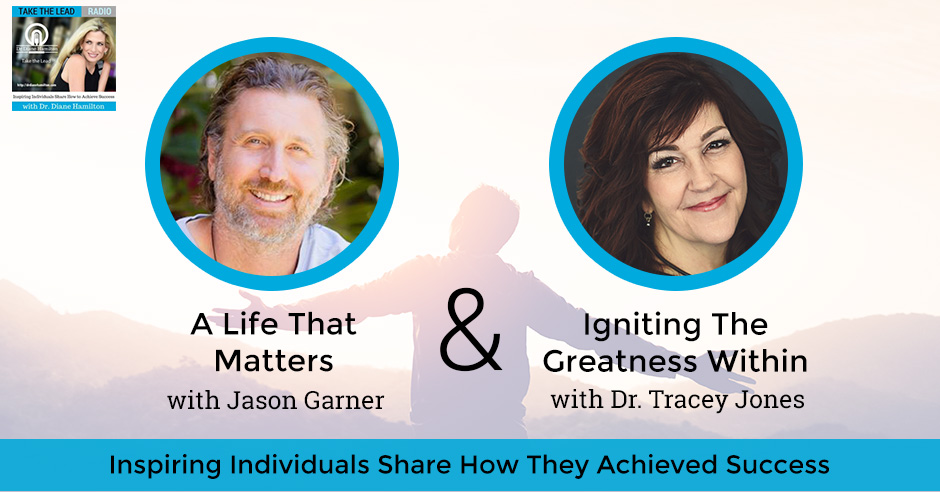Growing up poor and raised by a single mom, Jason Garner always dreamed about being financially successful. With determination and ingenuity, his hard work paid off and eventually landed him the position of Head of Global Music for Live Nation. While on the outside Jason may have made it, he still felt an emptiness and a hole inside. On today’s podcast, Jason joins Dr. Diane Hamilton for an intimate conversation about how he finally took the time off to tend to his heart and truly feel successful. Tune in to discover Jason’s journey from a life of matter to a life that matters.
Greatness is an inside job. In such a challenging time, we need to ignite our greatness, that spark, in order to keep going. In this episode, Dr. Diane Hamilton brings on Dr. Tracey Jones, the President of Tremendous Leadership and the author of SPARK: 5 Essentials to Ignite the Greatness Within. Dr. Jones dives into the importance of focus, vision, and having the right advocate to get us through these times and keep moving forward.
I’m glad you joined us because we have Jason Garner and Dr. Tracey Jones here. Jason is the former CEO of Global Music at Live Nation. He’s now the author of And I Breathed. Tracey is the President of Tremendous Leadership and the author of ten books. We’re going to learn a lot about what Jason found in his journey and Tracey did in hers.
Watch the episode here:
Listen to the podcast here
A Life That Matters With Jason Garner
I am here with Jason Garner who’s the former CEO of Global Music at Live Nation. He is the author of And I Breathed, which explores his journey from life of matter to a life that matters. It’s nice to have you here, Jason.
Thank you. It’s great to be with you.
I was very interested in your story of what some people look at as the success of being a former Fortune 500 company executive to thinking maybe that’s not all that matters and what you’ve learned since then. I want to get a backstory on you to know what led you getting to this Live Nation position in the first place.
I was raised by a single mom and we grew up poor, free lunches at school and all of those things that many people go through, especially single parents. My whole life, I had a narrative in my head of, “I wanted to be financially successful,” and through that I would change my story and save my mom and myself and all those things that little boys and little girls aspire to do. I worked and worked and under this belief that if I wasn’t the best, I wasn’t good enough. I wasn’t loved. Over time, I worked at a flea market and I started putting bands on the little beer party at the flea market in an attempt to increase beer sales. Through a series of steps, that led me into the concert business. I worked my way up over several years. My last job before I went on the spiritual journey was the Head of Global Music for Live Nation.
What was the high and the low of being at that level?
The high is all of these things that we’re aspiring to. Power, money and also proximity to power and proximity to rockstars and being backstage or on a private jet or on tour with a band. The thing that many of us are discovering as many of us have lost jobs or life has slowed down, or we’ve been furloughed is that’s not enough and that there’s still emptiness and hole inside. We use these types of things. In my case, it was a sexy job, but all of us in our life somewhere are using something to turn away from our own pain, to turn away from our broken heartedness. That’s the low is that it’s easy to say, “I made it,” all the while masking as I was in my life broken marriages and broken heart and all of this pain from my life that I had never dealt with because I always had another show to go to or another artist to deal with.
You did a lot of shows and dealt with a lot of artists. I was looking at some of them, Coldplay, Toby Keith, Jenni Rivera, Enrique Iglesias and the boxing champ, Julio César Chávez. I’ve been looking at the list. It’s pretty impressive group of people, but it’s interesting to me. From being in my position, I’ve interviewed billionaires and people in the movies and different things like that. When I’ve gone to after parties of the Oscars or whatever, it’s not what you think it is. When you get back, you go, “This is it? It’s not very glamorous.”
We’re all still watching the movies from the ‘60s and ‘70s rock scene and thinking we’re going backstage to Mötley Crüe or something. They’re in big businesses now and everyone’s working. People would send me a note and say, “Could I come hang out backstage?” I would say, “Only if on Monday I can come hang out at your office.”
[bctt tweet=”An overactive brain can be counterproductive.” username=””]It is a different world and it does sound great. It’s sometimes better to have that perception of what it is because sometimes it is not as glamorous. It takes its toll on you. A lot of people don’t have a realistic expectation of the world sometimes. Maybe you get to the point where you thought it was too much and not what you wanted. It wasn’t making you happy. What did you do?
My mom was diagnosed with stage four stomach cancer while I was in the middle of my second divorce. I took time off for the first time in my life. My mom literally died in my arms, taking her last breath. It was this deep moment for me that said, “I need to figure out how to feel happy.” I’d done all these things I thought would make me happy and I needed to figure out like, “How can I feel successful? How can I experience this dream that was supposed to come through money and power?” I did. I took some time away from the business and went on this spiritual journey that I outlined in the book, but that I don’t think it’s necessary to walk away the way that I did.
I was blessed with privilege and resources to do that. What we have to start to look for is a simple question like, “How am I tending to my heart now?” Every day we get up, brush our teeth, wipe, wash, answer emails and we take care of our bosses and our clients. We don’t ever look inside and say like, “How will I tend to my heart?” I went around the world and I met with the best teachers I could find. I learned about how to accept my life and how to hold a bit more than my job and going all the time.
You learned this and you’ve written this book, but do you also have another job that you do in addition? What are you doing to produce income other than the book?
All the book writing workshops you go to, remember it will not produce revenue. I came back into the entertainment business and I consult with a small group of artists. I say on the alchemy of business, spirit and art. What that means is trying to apply the things I’ve learned to how can they make as much money as they can while honoring their heart and honoring their art? It’s confluence of the two big passions of my life, the spiritual meditation path and the music business. That’s how I spend my days when I’m not walking in the woods or meditating or hanging out with my family.
Which time do you spend meditating? I’m always interested in this because I’ve had many people who were meditation experts on the show and talking about different things at work for different people. Is this something you spend hours, minutes to? What’s your day like?
It depends. one thing that I was clear on is that I didn’t want my meditation practice to become another thing on the to-do list or another thing where I judge myself or one more area where Jason wasn’t good enough to my inner voice or to the world. There are days when things are heavy, where the most I can do is sit down in a chair and close my eyes and breathe for a few minutes and come back to my heart. I go on retreat every once in a while.
Sometimes that’s meditating all day long for a week. I don’t think there’s a right answer. The quest for that perfect meditation formula is one more way that we’re going to get lost up in our head and our thoughts. It’s about feeling into our own lives and into our own bodies. If all you can do is take a two-minute walk outside and try to listen to the birds and breathe, that’s plenty. You shouldn’t be taught that’s not enough because it has to be fifteen minutes in a chair in the corner of the room. Other times, a nice long sit is what the doctor ordered and that’s perfect too.

A Life That Matters: That sense of, “It’s okay to be human,” is a message we don’t hear enough in our world.
You don’t strike me as the hyperactive kind of person who couldn’t relax. Have you always been calm in that disposition or does this something that you’ve found from this?
My brain goes a lot. All these things that I’ve been able to do in my life are partly, a product of that overactive brain. What I’ve learned is that that can be counterproductive. We use this term balance a lot, which I don’t like because we’re never imbalanced. The laws of the universe are the way motion is created is something’s always tilting one way or the other. What we’re trying to do is make sure that we’re not choking out certain parts of our lives.
If you sit and meditate all day and choke out business completely, you won’t be able to pay your rent. Likewise, if we just work and work, look at the phone and follow election news all day, but soon we’re not going to be in touch with our heart. We’re not going to feel love, compassion and happiness. I only think it’s about balancing the hyperactivity that’s necessary to fill the bank account with some stillness and some quiet, which is necessary to fill the heart.
It’s challenging for me to quiet my mind. I noticed that more at night. You do work and then you lay down. I’m like one of those people that has maybe ten radio stations playing at the same time. It helps to distract me to get focused on one thing. I know that’s what the breathing is about, to get your focus on something to keep you in one focused area. I’m curious why the title and how you tie it into what we learned from breathing?
I felt like I had run through my life holding my breath. When I was writing the book, the dominant scene in a sensation in my body was sitting in my therapist’s office and then the sobbing came.
Is it more of the breathed out then?
It’s much more of exhale, “It’s okay. Life’s tough and we don’t give ourselves credit for what it takes to get up every day.” Thich Nhat Hanh, the great Zen practitioner says, “The miracle isn’t walking on clouds or water, the miracle is walking on the earth.” There’s this sense. When I was writing the book, I was like, “Life is tough,” and that exhale of, “I’m okay. It’s okay to be me. It’s okay to be afraid. It’s okay to be sad. It’s okay to not know what’s going to happen tomorrow and then you could let go.” You could feel where even a little let go is life lifesaving. It’s like you were saying about your meditation in the evening, you can’t make your thoughts stop. That’s not the way the brain is wired. What we’re doing is breathing and allowing space for our thoughts, allowing space for our humanity. That sense of, “It’s okay to be human,” is a message we don’t hear enough in our world.
I was thinking of what I do in the morning is I have an Echo. I think it pulls it from the Calm app. I’m not sure, but if you say, “Play a guided meditation,” it’ll play whatever it plays and it’s different every day, whatever it is. I start finding myself competing like, “Did I do more today?” Since you got to get away from. The problem is the Apple tell you, “Congratulations. You’ve done 3.57 hours.” I’m thinking, “I got to break three more minutes.” I wish they didn’t tell you that because that messes with me completely.
I think we have to love that part of ourselves because that’s how we got here. That part of ourselves that’s competitive and that part of ourselves that wants to go out and accomplish something and be good, that’s a useful skillset to have. We also have to honor that tender, quiet and still part of ourselves. I’m not a big fan of apps for meditating and tracking it. I see people posting online. It’s cool and if it works for people, that’s great. My guess is it’s reinforcing this sense of, “I’m not good enough unless I post a couple seconds longer than yesterday on my meditation app.” I think we start to miss the point. The point is you’re okay the way you are right now and it’s safe to stop and sit in the chair and breathe for five minutes. That’s a huge learning for a lot of us.
[bctt tweet=”The bigger the stage, the bigger the spotlight, the bigger the hole.” username=””]I had a lot of CEOs on the show and we talk about how CEOs all think that people are going to figure out that they don’t know as much as they should know, that fear that they’re going to be discovered. Even Keith Krach who’s the smartest guy on the planet who was this Chairman and CEO of DocuSign, we were talking about going back to be the CEO of DocuSign. He says, “I told my wife I’m going to be in a fetal position under my desk for a few nights here and there.” He’s honest about how hard, and he doesn’t try to pretend like this blow fish that, “I’m this big puffer fish that I know more than I do.” That’s an important thing for CEOs is to learn that everybody doesn’t know everything. You were working with some famous people and did they all have that sense that everybody thinks that they’re better than they think they are? Is this something universal?
If you know our name, it’s because we have a big hole inside and the bigger the stage, the bigger the spotlight, the bigger the hole. That’s what’s driving people to be powerful, famous and remembered legacy. All these things that we talk about are more often than not being driven by a level of pain and insecurity inside. If 10,000 people clap for me every night or I meet my quarterly goals, then I’ll be good, be loved and be remembered and cool. At some point, I think that we start to turn inside and then we can tend to that pain in a meaningful way because all of the external stuff, it’s a mask. It’s an aspirin when you have a broken leg, but we’d have to say, “My heart is worth tending to the way I tend to my business.” That for me was a big realization.
If you think about all the movies that you’ve been making about Queen or Elton John and the ones that you think have everything and then you look at the back story and they seem vulnerable to people taking advantage of them. It almost seems like every one of those stories or someone who gets in and takes them for everything and then they’re crushed and you see a lot of that and what you were dealing with your life. Do you find a lot of them have this same realization that you’ve had, that they’ve gone out and come back and it seems like Elton John’s turned his situation around and people like that? Is there always going to be that big hole as long as you’re out there in the public?
It’s a universal story. As you say, it’s the plot line of half the movies we watch on TV of, “I feel pain.” I go out and achieve something in the world believing that will fill the pain and then I learned that didn’t do it. I turn inward, find the teacher, do some yoga, do some breathing and go on some journey or whatever everyone’s individual path is. We see it everywhere. We see it in business, in some areas of politics, in music, in art where people aren’t realizing that in this go world, imagine now we’re working from home and we don’t even have that to go to anymore.
We have to discover the inner home. That is the essence of meditation, which is there is a sanctuary, there is an okayness inside that we can connect to and it seems silly. After a life of doing that the answer is to sit in the chair and breathe for a few minutes. It is that place where we can go. When we do it with a sense of love, compassion, spaciousness, we start to, one, get to know ourselves and second, start to accept ourselves and then, we can go back to whatever our job is, whether it’s rockstar or CEO or wherever we are in the world. We can come that come at it from a sense of a little bit more wholeness and a little bit more of okayness in ourselves and not be so needy for the world to fill what we haven’t felt for ourselves.
Now that when you’ve learned what you’ve learned, would you want to be a Fortune 500 company executive again?
I have a lot of compassion for the people that are running businesses. I look at it and I see people having to make excruciating decisions of furloughs and shutting down businesses. I do not know that I could or that I would want to do that, but it’s possible though. That’s the thing. We all inside are drawn to certain things in certain jobs and certain hobbies and certain vocations. The issue is not what the job is, but how are we going to do it? That’s playing out clearly in our world like, “What are you bringing to your job?” The answer is that your brain comes, but so does your pain and trauma.
When we don’t deal with our trauma, then we sit around a conference table like little children arguing about pain that we had when we were three and thinking that we’re arguing about a negotiation or a pay. All these jobs are possible and I don’t think there’s like a ranking of a job that’s more spiritual than another. The answer is, “What are we doing to tend to our own heart?” When we do that, we bring that to work with us and we’re more mature, whole and okay. Suddenly, the business meeting can be a meeting of two humans talking about a business issue versus two people with unhealed pain, arguing about how hurt they are inside.

A Life That Matters: A business success combined with emotional and spiritual wellbeing is one of the greatest feelings in the world.
There’s such a focus when the people I talked to who are trying to be the next Apple or whatever. They all want to have this unicorn. To have that, you can’t be sitting in a yoga position all day long. Is it okay for some people that that’s the life they picked? Do they have to have a hole in them if they’re a success in that respect? I am curious if you think that it works for some people, but not others.
Everything’s okay. I’m not evangelical about what I’ve learned. I know and have known lots of extremely successful people and to a T every one of them at some point, have had a moment where they’ve said, “I forgot to turn inside and I’ve got to care for myself.” I guess everything is possible that someone was born whole, never traumatized and went out and succeeded in the world. For the most part, most of us have learned that we’re supposed to care for what’s out there, but not what’s inside. When we do that, then our quest for the unicorn is fulfilling.
A business success combined with emotional, spiritual wellbeing, is one of the greatest feelings in the world. What we find is you get the unicorn, but then the next day you have the same feeling inside so you have to go find the next unicorn and that’s what this thing is doing to us. Whereas, when we do have a sense of inner okayness, we have a business success and it’s, “That’s meaningful. I can feel it and enjoy it,” versus my mind immediately skipping to, “Someone’s going to take it away. How do I get the next one?” All of these things that most of us are experienced is that’s what we find inside our head.
There are always exceptions. I always wondered about like the Ron Howard or I’ve gotten through a lot of people look at as something that most people crash and burn when they get certain level of success, especially childhood actors and different things. It’s interesting to see what works for everybody. I was glad to have you on to talk about what you’ve worked on. If anybody wants to get your book And I Breathed, how can they find that? How can they find you if you have something to share?
I have a website which is JasonGarner.com. I’m on Instagram and Twitter which is @TheJasonGarner. I post stuff there every day. That sounds a lot like what we talked about.
This has been important. We had Daniel Goleman talk about on the show. I enjoyed researching that for my dissertation and it was a huge topic, emotional intelligence, and now he’s in the mindfulness aspect of it. It’s wonderful to have you on the show, Jason. Thank you for being on.
Igniting The Greatness Within With Dr. Tracey Jones
I am here with author, speaker and international leadership expert, Dr. Tracey Jones who’s the President of Tremendous Leadership. She picked up the reigns from her father, Charlie “Tremendous” Jones in 2008. She has a book that I’m anxious to talk to her about called SPARK: 5 Essentials to Ignite the Greatness Within. I’m interested in that and how it ties into curiosity. We’re going to have great talks. Welcome.
[bctt tweet=”Greatness is an inside job.” username=””]Thank you, Diane. It is tremendous to be here with you.
You get to use that a lot. I want to know where that came from originally?
That came from my dad. My father’s name was Charlie “Tremendous” Jones. Whenever somebody would come to him and he said, “He got it because of a limited vocabulary.” People would say, “Charlie, we just had a baby.” He’d say, “Tremendous.” “Charlie, we sold $1 million policy,” “Tremendous.” “Charlie, my mother-in-law died,” “Tremendous.” People laugh because he only put these mother-in-law jokes, but it was all about, “Be careful about what words you use because it’ll stick with you.” Even if things aren’t going tremendous, if I say they are, they start going tremendous.
I’m getting Zig Ziglar, “It’s great, but getting better.”
He and Zig were dear friends, colleagues, spoke together, share the stage many times and Zig was a dear man in my father’s life.
I’ve had many great motivational speakers from Tom Hopkins and beyond. It’s fun to talk about motivation. You got your PhD in the theory of motivation. Is that a business degree? What is this theory of motivation?
It’s a Leadership degree. The PhD is in Leadership and it was the intersection of crisis leadership followership and self-efficacy. Self-efficacy is a million-dollar research word for motivation. If you are efficacious, you are intrinsically, self-motivated, self-discipline and you own your locus of control. That’s what I wanted to study in a crisis organization or crisis event. If the leader brought something out in the follower or what happened there, that’s what it was. I’d say the theory of motivation because that’s in layman’s terms, but what can be self-efficacy is.
You have this event now. What you’ve learned must have prepared you for this, but I’m sure nobody foresaw this. What you learn tie into what you are seeing right now?

A Life That Matters: Self-efficacy is a million-dollar research word for motivation. If you are efficacious, you are intrinsically self-motivated, self-disciplined, and you own your locus of control.
It’s interesting because when I was studying the event and the book was coming out in March 2020, so is everything else. I’m like, “How is this going to land? Am I going to sound toned up talking about, ‘We have greatness within?’” No. Greatness truly is an inside job. I’m telling you this pandemic and everything going on right now gave us the opportunity. You either have to own what inside of you, that it can get you through anything or not. Part of it was, Diane, when I was doing my research, I was looking at followers and leaders and to delete or do something that made you run into the burning building or run out of it. Why did you stay to fight the fight while other people ran away? What I started realizing was that great leadership is great, but for people that are exemplary followers and that are already all-in, they’re in regardless of what’s going on.
What I tell people is this pandemic didn’t turn you into a fighter or a coward. It revealed what was inside. If you were upset with the world, didn’t like your job and were scared before the pandemic, you probably still are. If going into pandemic, you have this sense of resilience and adaptive capacity, a crisis always magnifies that in a beautiful way. You’re where everybody else is falling behind and ruminating on negativity and the worst possible scenario, you’re like, “No. We got to move on. This is an opportunity to clear the crap out of my life and get focused on what’s the comp.” That’s all I got. I’ve had such an incredible seven months despite having catching it myself, getting better kidney stone and eye surgery. It was a rough seven months, but I also had the opportunity yet to get clear on, “If this is the new normal, what is my new normal going to be?” I’m thankful for that.
A lot of people are asking themselves that question. It’s such a challenging time. I had some crisis readiness experts on the show in the past. We never talked about the pandemic as being a potential crisis, you think of other things, but everybody’s having to learn. To me, it all ties into whether you have a company that’s stuck in status quo behaviors, or if they’re open to learning. When I talk about curiosity, I often talk about curiosity as the spark. I love that your book is titled Spark. I’ve had some motivation experts on, and we talk about what comes first, motivation or curiosity or curiosity or creativity and all that. Where do you think? What comes first? I want to get your insights there.
I love that you’re a curiosity expert because that’s what I would say Spark is. My book drills into, you can be incredibly motivated about a lot of different things, but unless you dial it in what it is that you’re going to be driving toward, unless you prioritize and get singularly focused, you’re going to burn yourself out. Trust me, I did it for twenty years. I had to do everything well and, in the end, I was draining my own self.
I think curiosity is the point of ignition to spark where you sit there and go, “Why not me and why not now? Why can’t I develop myself into becoming what I always know is in there?” Not to be like somebody else. I tell people, “We’re not here to mold you. We’re here to unfold you.” Until you even look in the mirror and say, “Could this be me?” That’s the word you said, it’s curiosity. That spark, if you fuel it and you own it and you feed it with the right combustible materials, then you start blazing into this next level of greatness. I think the curiosity comes first.
It’s the absolute majority, 100% have answer it that way. When I researched curiosity, my interest was, “What stops it? What inhibits it so that we can move forward?” I found that there were four things and it’s fear, assumptions or that voice in your head, technology which is over and underutilization of it, and environment which has everybody with whom you’ve had contact. There are many people who get discouraged because of people they’ve been around or their parents have said things that have made them think they have to go in a certain direction or their friends did things or they’re worried they’re going to make a mistake. You did a lot of interviews for The Price of Leadership.
My dad always talked about is leadership is tough, it’s glorious, but it’s life. It’s this “bittersweet symphony.” It’s one of these things that you’re going to be victorious, but you’re also going be bloody. One of the things with the leaders is there’s going to be times when you’re lonely, but there’s good and bad loneliness. You’re going to be weary. There’s good weariness like fighting the good fight and bad weariness where you’re emotionally exhausted. There’s abandonment where you have to stop. You have to get hyper focused on what you need to think about and not what you want to think about and then the fourth is importance of vision.
Everybody dialed in is not acting soon enough and you talked about why you have fear, lack of resources, when they knew intuitively there was something going on in the organization, but they didn’t act on it. That’s pretty much the biggest thing that everybody goes to, but it’s a process. I look back even few years ago at some of the leadership decisions I made and my epic failures. That’s how we learned the best from gaining experience.
[bctt tweet=”We learn the best from gaining experience.” username=””]We were talking a little bit before the show and I had Jim Kouzes on the show before you, and he was saying, “People who think you got to get it right the first time, that’s impossible. There’s nothing you did right the first time.” We’re all going to have a certain amount of failures. People sometimes are worried about failing that they don’t do anything. You interviewed these people and you found out about their mistakes, but you also found out about their achievements. I’m curious what are some of those great achievements you learned from those interviews?
I think it was about that you can’t get it right without the right people and that what SPARK’s acronym, Singularity, you have to have your vision. You can’t be clear as a leader until, and attract the right followers until you dial in. It’s the old Jim Collins, TED Talks principle, “What is your message that the world needs to hear and you can deliver better than anybody else? Number three, that you can make a living doing?” The leader needs to be all in and clear on where they’re going and then persist. You need resources, advocates and knowledge. That’s ARK, Advocate, Resources and Knowledge. Their journey was all about the right people at the right time for the right purpose and to always reading, continuous learning or unlearning what you thought you knew and relearning without reading book.
My father always said, “You’re going to be the same person five years from now that you are now, except for two things, the people you meet and the books you read.” These interviews are content rich with books that transformed their life and people that are continually pouring them in and raising them to the next level. That is the common tricks. Last one is everybody says that their vision is tied to serving other people. Every leader has said that. They had this altruism it’s defined, but there’s a higher purpose for their vision and that’s what attracts people to your ministry, to your mission, to whatever it is.
When you said advocates was with A, how do you know who your advocates are? Some people are out there promoting you and saying great things and you don’t even know about it.
This is one of the areas that I was missing for about ten years. I was successful, but it was hard. I didn’t have peace and I kept making the wrong hires and the wrong mistakes and the wrong myths. I’m like, “I’m done, what if it’s not tremendous?” Henry Cloud is one of my favorite authors. He wrote a book called The Power of the Other. I read that and I realized I have a lot of quadrant 1, 2 and 3 people in my life. I need to focus on my quadrant four. When I became intentional about that, they were all around me.
I was blocking them. I wasn’t open to receive. It’s like I try and catch the butterfly versus letting the butterfly land and left me. I tell people, “Stop looking and start receiving. People are there that want to pour into you, but you got to get rid of all the other junk. It’s time to suck in you and your resources.” That’s what I did. I was ready to quit. I’m like, “I’m done.” He’s like, “You can’t quit because you don’t have the right advocates.” When you get the right advocate? They want your success more than you. They’ll help make the connection, they’ll help carry the load and they’ll be your champions or your prefect. I’m like, “I think I knew this earlier, but I never needed it.”
When you talk about junk though, what are the time-sucking things that keep people from moving forward?
The time-sucking things are when you get clear, you’re too open-minded. You’re not clear on your vision. They talk about spiritual gifts. One of my gifts was with gift to complication, and every new idea I heard, I’m like, “Let’s do this, let’s do that.” I was incredibly scattered. When you get clear on where you’re going, you start knowing who to have conversations with and who to say, “Thank you. I’m not interested.” Getting drilled down and dialed into what you’re looking for and then you start training and collaborating with the right people. Other times, sucks are, I rarely touch social media or the TV. I haven’t watched the news in a few years.

The Price of Leadership (Life Changing Classics, Volume XI)
These are things that are not value added. The other thing is I was looking at groups that I was in boards and everything, and I said, “I know I’m here to serve them, but there should be a sense of reciprocity. We should be lifting each other up.” I’ve gotten shrewd and people like that, “The best me.” No, shrewd to the beautiful thing, because this is where my nut cutter side, my targeted because I’m an engineer by training. I was in the military. I want to get down and say, “Is this value added or is this not?” When you abandon the stuff on your plate, you’re going to realize there are 3 or 4 in a day that don’t only not just contribute to your success but are working against you. Get singular and organized in the plan and where you spend your time and who you’re spending your time with.
I’m glad you brought up that you were in the military because I know that you’re a graduate the US Air Force Academy and decorated veteran served in the first Gulf War in Bosnian War. I teach for different universities. One of them is a military based university. I have a lot of students there that they always are giving me these great examples that are military based, but I personally have not served in the military. I always love to talk to them about what the differences are between military leadership and civilian leadership. I’m curious what you’ve seen as the differences and how does curiosity and questioning status quo differ in the military leadership versus civilian?
Having been in both, I did twelve in active duty. Ten Fortune 100 government contracting and then twelve doing my own entrepreneurship. Critical thinking skills are the same wherever you are. Robert Kelly has a wonderful construct about the bond followership styles and it’s all inactive engagement and critical thinking skills. I had been a critical thinker and it’s different than having a critical spirit in the military as well as in Fortune 100 semiconductor everywhere. I would always be some people that would be open to hearing it and people that weren’t. I don’t think that’s industry specific. The difference between the military is you can get stuff done through power because there’s rank and if people don’t follow you, that’s insubordination. When you’re outside in the civilian sector, it’s more influence. What I love about the military is they’re focused on trust first.
“I don’t have to like you. We don’t have to be unified, but we do have to trust one another because I got to know that you’ve got my back.” There’s something beautiful about that, whereas we get wrapped up in the civilian sector about these culture things that we become all, 50 million little separate entities with feelings, motives and desires, we lose this cohesion. I love the military because they’re also targeted. What I learned in the military was we can’t talk about a solution until we’re clear on what the real issue is. That’s something that I strive to bring my civilian counterparts because if you don’t understand, and again, that gets to your critical thinking skills, you’re going to be barking up the wrong tree and waste a lot of resources. That’s the biggest difference I saw.
You bring up a lot that I talk about with the curiosity about how do you get the solution without asking about the problems and that builds empathy, which is a big part of emotional intelligence. When I talk to groups about curiosity, they often bring up trust. I’m glad you brought up trust because we know the four factors that inhibit curiosity. The first one is fear and the fear is looking dumb, being embarrassed, having their idea of somehow criticized and that could tie into trust. I wanted to get your insight on trust and curiosity.
It’s like resiliency in a crisis event. It’s something built into you. It’s the space shuttle where the guys took off and saw the panels that the foam that came off the side. If you read that to buckle as well, “I didn’t feel I could raise the flag.” False. I’m sorry. I don’t buy that because I’ve been in organizations where I had to stand up as a lone wolf and say, “We can’t do this.” You can’t claim to be all in if you’re not. I got off an interview with a retired admiral, Paul Becker and he was talking about the one time as an intelligence officer, he looked at some stuff and he said, “We can’t do this.”
Everybody looked at him like he’s radioactive, but other people see it. It’s not just trust. It’s more courage because the fallacy is when we do the right thing and we state the right thing that everybody’s going to applaud us. That’s not going to happen. History is rife with examples of people standing up for the right thing, but you do it because first and foremost, you have to follow your conviction. When you do that, whatever fallout happens and it will happen. A great organization, they’ll listen.
That ties into that voice in our head, which I call assumptions that what’s going to happen if you do it. You tell yourself. You’ve got this dilated monologue going on in your head of, “What’s going to happen if I do this?” That’s when you start questioning things and that’s where trust comes in too.
[bctt tweet=”Whatever you sell, make sure it’s not your soul.” username=””]You have to trust yourself first and foremost. I was in New York City for a book launch party and Mitzi Perdue, Frank Perdue’s widow hosted it for me. She talked about that her fundraisers for human trafficking and someone had given her a 69-carat perfect Ruby to auction at Sotheby’s to raise money. It was that thing because she was in not a sketchy part of the world and they’re like, “If they find out we’re giving you this and you raise money to fight against human trafficking, the human traffickers aren’t going to like it. They could kill you. What do you think about that?”
Mitzi said, “Then, so be it. This is where I am.” They looked at her and said, “You’re the right person for the mission.” I think when you’re curious and not to raise something that you know it’s not going to be the most popular opinion, true courage happens when you’re affirmed in your convictions and your values that you’d rather not be in the organization than being an organization where it’s going wrong. I only listen to the spirits deuce for so long, especially in America, you can always get another job. If it’s illegal or immoral or unethical, you can call the newspapers. You could go and get legal.
I watched people say, “I thought if I said something.” This isn’t a dictatorship. We are allowed to voice opinions. I always suspect that, I know there’s going to be a cost. You count the cost, but why would you want to stay in an organization that if you raised something valuable, would poop on you, counted a blessing because you’re not long for that organization and you’re going to have to sell your soul, or you’re going to have to smoothed over your convictions so you can just be one of the crowds and that, some bad thing happen.
It used to be such a problem. In my generation, where I stayed in one company nearly twenty years, you don’t see people doing that anymore. You didn’t want to ruffle feathers if you’re going to stay in a company for twenty years, but who does that anymore? It’s a different world.
I say that to people. I’m like, “It’s different. Everybody can work. It’s not like your family’s going to be destitute if you say, ‘I’m going someplace else.’” Whatever you sell, make sure it’s not your soul. You have to stay true to it because once you start down thing that spirit of conviction, which I also tie that back to trust and creativity, then you become a cog in the wheel and you get where people get sick. I think that they hate work and they hate their boss and they’re disengaged. It’s like 68% of people who are not engaged. We don’t want to be like that. We can’t do it. We’re not made as you. It’s not the way it’s supposed to be.
I have chapters on that and in my books on curiosity and perception, because the curiosity spark that wanting to know things can align you better with jobs, tasks and things. Maybe people are disengaged because they’re not aligned to the best thing. As technology takes over, this is our chance to say, “I don’t like doing this anyway.” We can do that.

The Power of the Other: The Startling Effect Other people Have on You, from the Boardroom to the Bedroom and Beyond – and What to Do About It
You hit the nail on the head in his SPARK course that we’re doing. Like I said, everybody’s like late 40, 50, 60, 70s, they’re like, “If I did that before, what do I want to do? What is the highest version of me?” They’re imagining themselves in different roles and that’s the beauty that whatever, any stage in your life, there is no wall on too far gone. No that’s on you because the spark of creativity and curiosity that burns up until your very last breath. People are more open now to going, “What does my life count for and how can I make the best run in this mortal coil on this planet?” I’m thankful for that because that’s what makes the world a more incredible place.
Your book is timely and I hope people take some time to look at this Spark: 5 Essentials to Ignite the Greatness Within. There are many things that we need to ignite, to get that spark going. I am excited for the launch of your book. I think a lot of people are to want to follow you and find out more. Is there a website or someplace they can get your book or follow you?
The best way to reach me is www.TremendousLeadership.com. Our books are there. The paperback and eBook are on Amazon. The audio and hard cover is on Tremendous Leadership. We’ve got incredible resources, two free weeks of eBooks, webinars, Tremendous Leadership Podcasts. If you get to Tremendous Leadership, you can find me on Facebook, LinkedIn, Instagram, Twitter you name it, all that good stuff. You can email me and I will answer you from my global headquarters right in my kitchen with my dog.
Thank you for being on the show. This was interesting. I knew it would be fun and I enjoyed meeting you.
Thank you, Diane. What an honor. Thank you for all you’re doing too.
You’re welcome. I hope everybody takes some time to take a look at Tracey’s work.
—
I’d like to thank both Jason and Dr. Tracey for being my guests. We get many amazing guests on this show. If you’ve missed any past episodes, you can catch them on my site at DrDianeHamilton.com. We are on all the radio stations listed on the site, as well as all the podcast stations. If you find something that you like, tweet it out and let me know what you found interesting about the show. We get a lot of great guests and you can listen to the show and read it there. You can also find out more about Cracking the Curiosity Code and The Power of Perception, and also the assessments for developing your curiosity and your perception are on the site as well. A wealth of information, anything that you’re looking for in terms of the assessments, if you don’t find it at the top, drop down menus, look at the bottom because we have links to become affiliates and all that is all at the bottom as well. If you can’t find something, contact me. I’d love to hear from you. I hope you enjoyed the episode. I hope you join us for the next episode.
Important Links:
- JasonGarner.com
- And I Breathed
- Calm
- Keith Krach – Previous episode
- DocuSign
- Instagram – Jason Garner
- @TheJasonGarner – Twitter
- Tremendous Leadership
- Daniel Goleman – Previous Episode
- SPARK: 5 Essentials to Ignite the Greatness Within
- The Price of Leadership
- The Power of the Other
- Tremendous Leadership – Facebook
- LinkedIn – Tremendous Leadership
- Instagram – Tremendous Leadership
- Twitter – Tremendous Leadership
- Cracking the Curiosity Code
- The Power of Perception
About Jason Garner

I took a break from the endless treadmill of my life and got to know myself at the feet of amazing teachers. I studied health and spirituality and the inner-workings of my mind, I met the woman of my dreams, and, for the first time in my life … I breathed.
About Dr. Tracey Jones

Love the show? Subscribe, rate, review, and share!




0 Comments